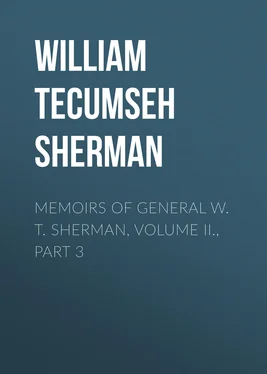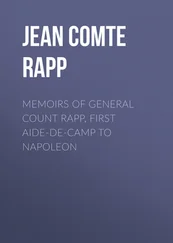William Tecumseh Sherman - Memoirs of General W. T. Sherman, Volume II., Part 3
Здесь есть возможность читать онлайн «William Tecumseh Sherman - Memoirs of General W. T. Sherman, Volume II., Part 3» — ознакомительный отрывок электронной книги совершенно бесплатно, а после прочтения отрывка купить полную версию. В некоторых случаях можно слушать аудио, скачать через торрент в формате fb2 и присутствует краткое содержание. Жанр: Биографии и Мемуары, История, foreign_edu, foreign_antique, foreign_prose, на английском языке. Описание произведения, (предисловие) а так же отзывы посетителей доступны на портале библиотеки ЛибКат.
- Название:Memoirs of General W. T. Sherman, Volume II., Part 3
- Автор:
- Жанр:
- Год:неизвестен
- ISBN:нет данных
- Рейтинг книги:3 / 5. Голосов: 1
-
Избранное:Добавить в избранное
- Отзывы:
-
Ваша оценка:
- 60
- 1
- 2
- 3
- 4
- 5
Memoirs of General W. T. Sherman, Volume II., Part 3: краткое содержание, описание и аннотация
Предлагаем к чтению аннотацию, описание, краткое содержание или предисловие (зависит от того, что написал сам автор книги «Memoirs of General W. T. Sherman, Volume II., Part 3»). Если вы не нашли необходимую информацию о книге — напишите в комментариях, мы постараемся отыскать её.
Memoirs of General W. T. Sherman, Volume II., Part 3 — читать онлайн ознакомительный отрывок
Ниже представлен текст книги, разбитый по страницам. Система сохранения места последней прочитанной страницы, позволяет с удобством читать онлайн бесплатно книгу «Memoirs of General W. T. Sherman, Volume II., Part 3», без необходимости каждый раз заново искать на чём Вы остановились. Поставьте закладку, и сможете в любой момент перейти на страницу, на которой закончили чтение.
Интервал:
Закладка:
The Army of the Potomac looks well, and, so far as I can judge, officers and men feel well. Yours truly,
U. S. GRANT, Lieutenant-General.
HEADQUARTERS MILITARY DIVISION OF THE MISSISSIPPI NASHVILLE, TENNESSEE, April 24, 1864
Lieutenant-General U. S. GRANT, Commander-in-Chief, Culpepper, Virginia
GENERAL: I now have, at the hands of Colonel Comstock, of your staff, the letter of April 19th, and am as far prepared to assume the offensive as possible. I only ask as much time as you think proper, to enable me to get up McPherson's two divisions from Cairo. Their furloughs will expire about this time, and some of them should now be in motion for Clifton, whence they will march to Decatur, to join General Dodge.
McPherson is ordered to assemble the Fifteenth Corps near Larkin's, and to get the Sixteenth and Seventeenth Corps (Dodge and Blair) at Decatur at the earliest possible moment. From these two points he will direct his forces on Lebanon, Summerville, and Lafayette, where he will act against Johnston, if he accept battle at Dalton; or move in the direction of Rome, if the enemy give up Dalton, and fall behind the Oostenaula or Etowah. I see that there is some risk in dividing our forces, but Thomas and Schofield will have strength enough to cover all the valleys as far as Dalton; and, should Johnston turn his whole force against McPherson, the latter will have his bridge at Larkin's, and the route to Chattanooga via Willa's Valley and the Chattanooga Creek, open for retreat; and if Johnston attempt to leave Dalton, Thomas will have force enough to push on through Dalton to Kingston, which will checkmate him. My own opinion is that Johnston will be compelled to hang to his railroad, the only possible avenue of supply to his army, estimated at from forty-five to sixty thousand men.
At Lafayette all our armies will be together, and if Johnston stands at Dalton we must attack him in position. Thomas feels certain that he has no material increase of force, and that he has not sent away Hardee, or any part of his army. Supplies are the great question. I have materially increased the number of cars daily. When I got here, the average was from sixty-five to eighty per day. Yesterday the report was one hundred and ninety-three; to-day, one hundred and thirty-four; and my estimate is that one hundred and forty-five cars per day will give us a day's supply and a day's accumulation.
McPherson is ordered to carry in wagons twenty day's rations, and to rely on the depot at Ringgold for the renewal of his bread. Beeves are now being driven on the hoof to the front; and the commissary, Colonel Beckwith, seems fully alive to the importance of the whole matter.
Our weakest point will be from the direction of Decatur, and I will be forced to risk something from that quarter, depending on the fact that the enemy has no force available with which to threaten our communications from that direction.
Colonel Comstock will explain to you personally much that I cannot commit to paper. I am, with great respect,
W. T. SHERMAN, Major-General.
On the 28th of April I removed my headquarters to Chattanooga, and prepared for taking the field in person. General Grant had first indicated the 30th of April as the day for the simultaneous advance, but subsequently changed the day to May 5th. McPhersons troops were brought forward rapidly to Chattanooga, partly by rail and partly by marching. Thomas's troops were already in position (his advance being out as far as Ringgold-eighteen miles), and Schofield was marching down by Cleveland to Red Clay and Catoosa Springs. On the 4th of May, Thomas was in person at Ringgold, his left at Catoosa, and his right at Leet's Tan-yard. Schofield was at Red Clay, closing upon Thomas's left; and McPherson was moving rapidly into Chattanooga, and out toward Gordon's Mill.
On the 5th I rode out to Ringgold, and on the very day appointed by General Grant from his headquarters in Virginia the great campaign was begun. To give all the minute details will involve more than is contemplated, and I will endeavor only to trace the principal events, or rather to record such as weighed heaviest on my own mind at the time, and which now remain best fixed in my memory.
My general headquarters and official records remained back at Nashville, and I had near me only my personal staff and inspectors-general, with about half a dozen wagons, and a single company of Ohio sharp-shooters (commanded by Lieutenant McCrory) as headquarters or camp guard. I also had a small company of irregular Alabama cavalry (commanded by Lieutenant Snelling), used mostly as orderlies and couriers. No wall-tents were allowed, only the flies. Our mess establishment was less in bulk than that of any of the brigade commanders; nor was this from an indifference to the ordinary comforts of life, but because I wanted to set the example, and gradually to convert all parts of that army into a mobile machine, willing and able to start at a minute's notice, and to subsist on the scantiest food. To reap absolute success might involve the necessity even of dropping all wagons, and to subsist on the chance food which the country was known to contain. I had obtained not only the United States census-tables of 1860, but a compilation made by the Controller of the State of Georgia for the purpose of taxation, containing in considerable detail the "population and statistics" of every county in Georgia. One of my aides (Captain Dayton) acted as assistant adjutant general, with an order-book, letter-book, and writing-paper, that filled a small chest not much larger than an ordinary candle-boa. The only reports and returns called for were the ordinary tri-monthly returns of "effective strength." As these accumulated they were sent back to Nashville, and afterward were embraced in the archives of the Military Division of the Mississippi, changed in 1865 to the Military Division of the Missouri, and I suppose they were burned in the Chicago fire of 1870. Still, duplicates remain of all essential papers in the archives of the War Department.
The 6th of May was given to Schofield and McPherson to get into position, and on the 7th General Thomas moved in force against Tunnel Hill, driving off a mere picket-guard of the enemy, and I was agreeably surprised to find that no damage had been done to the tunnel or the railroad. From Tunnel Hill I could look into the gorge by which the railroad passed through a straight and well-defined range of mountains, presenting sharp palisade faces, and known as "Rocky Face." The gorge itself was called the "Buzzard Roost." We could plainly see the enemy in this gorge and behind it, and Mill Creek which formed the gorge, flowing toward Dalton, had been dammed up, making a sort of irregular lake, filling the road, thereby obstructing it, and the enemy's batteries crowned the cliffs on either side. The position was very strong, and I knew that such a general as was my antagonist (Jos. Johnston), who had been there six months, had fortified it to the maximum. Therefore I had no intention to attack the position seriously in front, but depended on McPherson to capture and hold the railroad to its rear, which would force Johnston to detach largely against him, or rather, as I expected, to evacuate his position at Dalton altogether. My orders to Generals Thomas and Schofield were merely to press strongly at all points in front, ready to rush in on the first appearance of "let go," and, if possible, to catch our enemy in the confusion of retreat.
All the movements of the 7th and 8th were made exactly as ordered, and the enemy seemed quiescent, acting purely on the defensive.
I had constant communication with all parts of the army, and on the 9th McPherson's head of column entered and passed through Snake Creek, perfectly undefended, and accomplished a complete surprise to the enemy. At its farther debouche he met a cavalry brigade, easily driven, which retreated hastily north toward Dalton, and doubtless carried to Johnston the first serious intimation that a heavy force of infantry and artillery was to his rear and within a few miles of his railroad. I got a short note from McPherson that day (written at 2 p.m., when he was within a mile and a half of the railroad, above and near Resaca), and we all felt jubilant. I renewed orders to Thomas and Schofield to be ready for the instant pursuit of what I expected to be a broken and disordered army, forced to retreat by roads to the east of Resaca, which were known to be very rough and impracticable.
Читать дальшеИнтервал:
Закладка:
Похожие книги на «Memoirs of General W. T. Sherman, Volume II., Part 3»
Представляем Вашему вниманию похожие книги на «Memoirs of General W. T. Sherman, Volume II., Part 3» списком для выбора. Мы отобрали схожую по названию и смыслу литературу в надежде предоставить читателям больше вариантов отыскать новые, интересные, ещё непрочитанные произведения.
Обсуждение, отзывы о книге «Memoirs of General W. T. Sherman, Volume II., Part 3» и просто собственные мнения читателей. Оставьте ваши комментарии, напишите, что Вы думаете о произведении, его смысле или главных героях. Укажите что конкретно понравилось, а что нет, и почему Вы так считаете.












